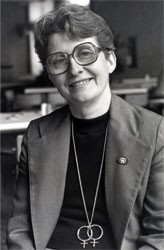Reader At Large
by Barbara Grier writing as “Gene Damon”
Photograph courtesy JEB[1]Barbara Grier image ©2017 by JEB (Joan E. Biren.) Used by permission.
Printed in the December 1965 issue of Tangents
 In a world where our daily privacy can easily become public knowledge and entrapment is still a constant threat, it is hard to see, or rather hard to acknowledge, that some of the theoretical freedoms are becoming real. The biggest of these is the freedom to print the truth. Consequently biography offers a new world to readers. No longer are all biographies gently edited out of all value. Men and women are being treated as whole persons, not sexless entities. We have seen this in the last few years in such fine studies as John Addington Symonds by Phyllis Grosskurth (London, Longmans, Green, 1964).
In a world where our daily privacy can easily become public knowledge and entrapment is still a constant threat, it is hard to see, or rather hard to acknowledge, that some of the theoretical freedoms are becoming real. The biggest of these is the freedom to print the truth. Consequently biography offers a new world to readers. No longer are all biographies gently edited out of all value. Men and women are being treated as whole persons, not sexless entities. We have seen this in the last few years in such fine studies as John Addington Symonds by Phyllis Grosskurth (London, Longmans, Green, 1964).
A recent addition to this new trend is Rupert Hart-Davis’ edition of Max Beerbohm’s Letters To Reggie Turner (Philadelphia, Lippincott, 1965). Reggie, of course, was homosexual and some of his affairs are discussed indirectly in Beerbohm’s witty, and sometimes moving, letters.
Viscount Churchill’s autobiography, Be All My Sins Remembered (Coward, McCann), includes revelations about the lesbian attachments of his mother. One of these affairs created much gossip and his mother, in an effort to stem this, forced him to marry her friend, a woman of some twenty years his senior. Qf course this did nothing to stop the gossip, in fact probably increased it.
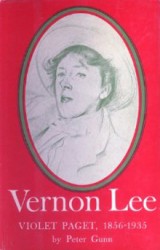 Peter Gunn’s Vernon Lee (London, Oxford University Press, 1964), is the first authorized biography of the semi-famous Victorian novelist, philosopher, art critic, and short story writer, Vernon Lee. She was born Violet Paget, hut lived and wrote as Vernon Lee. Sadly she was one of those apparently prevalent repressed lesbians of the Victorian era. Her life was marked by a series of upsets over the loss of this or that beloved friend, but it is clear that she never admitted the nature of her affection to herself, let alone to the objects of her emotion. There is every indication that she would have been a much happier woman if she had been able to cross that invisible but palpable boundary.
Peter Gunn’s Vernon Lee (London, Oxford University Press, 1964), is the first authorized biography of the semi-famous Victorian novelist, philosopher, art critic, and short story writer, Vernon Lee. She was born Violet Paget, hut lived and wrote as Vernon Lee. Sadly she was one of those apparently prevalent repressed lesbians of the Victorian era. Her life was marked by a series of upsets over the loss of this or that beloved friend, but it is clear that she never admitted the nature of her affection to herself, let alone to the objects of her emotion. There is every indication that she would have been a much happier woman if she had been able to cross that invisible but palpable boundary.
One of the most outstanding examples of the new “truth” trend in biographies is The Stuarts In Love by Maurice Ashley (London, Hodder, 1963; N. Y., Macmillan, 1964). Several of the Stuarts were homosexuals or at least homosexually inclined and Mr. Ashley covers this very frankly. He discusses the overt homosexuality of James I, William of Orange and Queen Anne, and the tendencies of Charles I, and William’s wife Mary. The book certainly makes clear how radically the love interests of the monarchs involved affected this 100 year period in English history, and since much of this was homosexual love it is doubly interesting to readers of this column. The writing, while remaining scholarly (the author is a recognized authority on this period of English history) is certainly not dull.
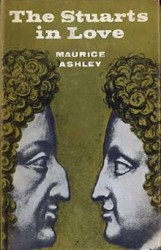 The Diary Of Alice James, edited by Leon Edel (Dodd, Mead, 1964), carefully delineates the life-long lesbian attachment between Alice James and Katharine Peabody Loring. Alice is famous primarily because of her illustrious family which included Henry, the novelist, and William, the psychologist. Although Alice was a partial invalid most of her adult life, she maintained a sense of humor and a sharp tongue and portions of her diary are interesting reading. However, Mr. Edel’s biographical section about the affair between Alice and her companion will be the drawing card here.
The Diary Of Alice James, edited by Leon Edel (Dodd, Mead, 1964), carefully delineates the life-long lesbian attachment between Alice James and Katharine Peabody Loring. Alice is famous primarily because of her illustrious family which included Henry, the novelist, and William, the psychologist. Although Alice was a partial invalid most of her adult life, she maintained a sense of humor and a sharp tongue and portions of her diary are interesting reading. However, Mr. Edel’s biographical section about the affair between Alice and her companion will be the drawing card here.
Batter My Heart, the autobiography of Donald Hayne, an ex-Roman Catholic priest, published by Knopf (1963), may seem an odd addition to this column. The author, however, confesses to his homosexuality (which he calmly indicates lasted until his thirties) and explains that (being a good Catholic) his only choice was celibacy. Later he left his church and married—but at the end of the book he was yet unreconciled and, as the title implies (taken from a sonnet by John Donne), not a happy man. His feelings are examined at some length.
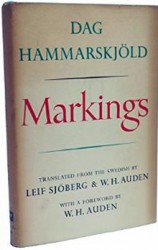 That most exquisite pain—the refusal to face one’s homosexuality squarely—has seldom been as expertly expressed as in Dag Hammarskjold’s fragmental autobiography, Markings (Alfred A. Knopf, 1964). So far critics have left unexpressed the suspicions of obvious deletions, for this is surely only one tiny portion of the whole. All that aside, this daily journal of a self-imposed crown of thorns evokes a pity akin to tears, not for his pain (though he suffered greatly) but for his shame. He frankly discusses his love for various men and an occasional “lapse” into overt sexuality—followed by the most intense mental self-flagellation. There is much more, undoubtedly, to his story and one hopes that, when sufficient time has passed, someone will have the data to tell it properly.
That most exquisite pain—the refusal to face one’s homosexuality squarely—has seldom been as expertly expressed as in Dag Hammarskjold’s fragmental autobiography, Markings (Alfred A. Knopf, 1964). So far critics have left unexpressed the suspicions of obvious deletions, for this is surely only one tiny portion of the whole. All that aside, this daily journal of a self-imposed crown of thorns evokes a pity akin to tears, not for his pain (though he suffered greatly) but for his shame. He frankly discusses his love for various men and an occasional “lapse” into overt sexuality—followed by the most intense mental self-flagellation. There is much more, undoubtedly, to his story and one hopes that, when sufficient time has passed, someone will have the data to tell it properly.
Unusual though it is, our next item was “written” in a non-existent language—Moghrebi (an Arabic dialect)—by Driss Ben Hamed Charadi, a North African Arab. Actually, A Life Full of Holes was tape-recorded first and translated by famous novelist Paul Bowles and published by Grove Press (1964). The life of Driss, an orphan child in the slums of French Morocco is a story of unbelievable horror; including anecdotes about eating and enjoying “white bean pudding with turnips,” etc. A variety of homosexual passes were made at Driss while he was growing up and at one point he worked for a homosexual male and his coterie. The book has been presented as a novel, but is actually an autobiography. In either category it is a poor book, interesting mainly as a curiosity. Best taken as a slice of life and raw at that.
William Shakespeare, the man, continues through the years to fascinate writers and countless biographies and fictionalized biographies of his life have appeared. One of the latest attempts to make him real and living in fictional form is Nothing Like The Sun by Anthony Burgess (Norton, 1964). Mr. Burgess sees the “dark lady” of the sonnets as a dusky Moor and names his male lover, Henry Wriothesley, 3rd Earl of Southampton. While an exciting novel, it is entirely restricted to those who enjoy historical novels, although Mr. Burgess has included some fairly conjectural love scenes.
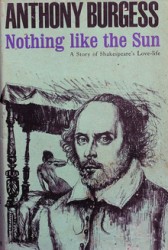 Turning briefly to fiction titles, Howard Clewes, a fair story teller, has a dressed up, spruced up Western, set in today’s Brazil where cattle raising is still a wild and primitive industry. The Libertines (Doubleday, 1964, 1965), in England called more aptly, Man On A Horse Jonathan Cape (1964), concerns in part the murder of a very sweet Indian gay boy, Jose Guata, by Denis Cassell, an emasculated type from the “home office.” Author Clewes, despite the killing, is more than fair in his handling of the homosexual aspects. Good first novels are often diminished by the faint praise “promising.” C.D.B. Bryan’s novel P. S. Wilkinson (Harper, 1965) deserves far more for it really is a polished, excellent novel, even overcoming the time-worn plot of “youngman against the world.” P. S. is heterosexual, but hardly a eunich [sic], so when he is examined by the C.I.A. for a potential post, his honesty in recounting his sexual history (including some childhood homosexuality) causes his rejection on the ground of homosexuality. A long section of the novel also covers his involvement with a pair of lesbians (pretty disillusioning for him).
Turning briefly to fiction titles, Howard Clewes, a fair story teller, has a dressed up, spruced up Western, set in today’s Brazil where cattle raising is still a wild and primitive industry. The Libertines (Doubleday, 1964, 1965), in England called more aptly, Man On A Horse Jonathan Cape (1964), concerns in part the murder of a very sweet Indian gay boy, Jose Guata, by Denis Cassell, an emasculated type from the “home office.” Author Clewes, despite the killing, is more than fair in his handling of the homosexual aspects. Good first novels are often diminished by the faint praise “promising.” C.D.B. Bryan’s novel P. S. Wilkinson (Harper, 1965) deserves far more for it really is a polished, excellent novel, even overcoming the time-worn plot of “youngman against the world.” P. S. is heterosexual, but hardly a eunich [sic], so when he is examined by the C.I.A. for a potential post, his honesty in recounting his sexual history (including some childhood homosexuality) causes his rejection on the ground of homosexuality. A long section of the novel also covers his involvement with a pair of lesbians (pretty disillusioning for him).
Burt Blechman’s staccato diatribe, Stations (Random House, 1964), is almost impossible to like, but must inevitably be admired for the writing skill. It is another of those joyless hysterical screams belching forth from our prematurely damned youth. Held against an adult novel, where responsible people are portrayed (Christopher Isherwood’s recent A Single Man for example) it seems puerile. The anti-hero, called “ 901” hurries about obsessively through the New York subway system’s lavatories, pursued by a vice cop, and each station is symbolic of one of the stations of the cross. Too far out and far too young; not even enough sex for the literate voyeurs.
—GENE DAMON
©1965, 2017 by The Tangent Group. All rights reserved.

